UPS will pay $45 million to settle charges that it improperly valued its freight division, the Securities and Exchange Commission announced Friday.
The regulator agency said that UPS materially misrepresented its earnings because it failed to follow generally accepted accounting principles in valuing its freight unit.
The SEC order said that in 2019 UPS determined that its freight division was likely to sell for no more than about $650 million. UPS’s own analysis indicated that nearly $500 million of goodwill it had associated with the unit was impaired.
But instead of using its own analysis, the SEC said that UPS relied on an outside consultant’s valuation of the freight division, without giving the consultant information necessary to conduct a fair valuation of the business. The commission said that the consultant used assumptions approved by UPS and then estimated that the freight unit was worth about $2 billion – three times as much as UPS had determined.
Goodwill impairment is a term used in accounting to recognize that the face value of an asset on paper exceeds its fair value.
Based on the consultant's estimate, UPS didn't record a goodwill impairment in 2019, the SEC said. Had UPS properly valued the division, its earnings and other reported items would have been materially lower.
The SEC’s order also alleges that in 2020 UPS entered into a non-binding term sheet to sell the freight unit for $800 million with adjustments to be made later that were likely to reduce the final price.
Despite its own analysis and its entry into this term sheet, the Atlanta company again relied on a consultant’s valuation of the unit in 2020 to support not impairing the business’s goodwill. UPS also did not inform the consultant of the term sheet, the commission said.
Similar to the previous year, the SEC said that had UPS properly valued the freight division and impaired goodwill, its earnings and other reported items would have been materially lower.
“It is essential for companies to prepare reliable fair value estimates and impair goodwill when required," Melissa Hodgman, associate director, said in a statement. "UPS fell short of these obligations, repeatedly ignoring its own well-founded sale price estimates for Freight in favor of unreliable third-party valuations.”
Shares of UPS rose more than 2% Friday.
UPS said Friday that the amount of the settlement had been set aside and that it will have no material effect on its business.

FILE - A United Parcel Service truck is parked on a street, in New York, Thursday, May 11, 2023. (AP Photo/Richard Drew, File)
KYIV, Ukraine (AP) — NATO and Ukraine will hold emergency talks Tuesday after Russia attacked a central city with an experimental, hypersonic ballistic missile that escalated the nearly 33-month-old war.
The conflict is “entering a decisive phase,” Poland's Prime Minister Donald Tusk said Friday, and “taking on very dramatic dimensions.”
Ukraine’s parliament canceled a session as security was tightened following Thursday's Russian strike on a military facility in the city of Dnipro.
In a stark warning to the West, President Vladimir Putin said in a nationally televised speech that the attack with the intermediate-range Oreshnik missile was in retaliation for Kyiv’s use of U.S. and British longer-range missiles capable of striking deeper into Russian territory.
Putin said Western air defense systems would be powerless to stop the new missile.
Ukrainian military officials said the missile that hit Dnipro had reached a speed of Mach 11 and carried six nonnuclear warheads each releasing six submunitions.
Speaking Friday to military and weapons industries officials, Putin said Russia is launching production of the Oreshnik.
“No one in the world has such weapons,” he said with a thin smile. “Sooner or later other leading countries will also get them. We are aware that they are under development."
But he added, "we have this system now. And this is important.”
Testing the missile will continue, “including in combat, depending on the situation and the character of security threats created for Russia,” Putin said, noting there is ”a stockpile of such systems ready for use.”
Putin said that while it isn’t an intercontinental missile, it’s so powerful that the use of several of them fitted with conventional warheads in one attack could be as devastating as a strike with strategic — or nuclear — weapons.
Gen. Sergei Karakayev, head of Russia’s Strategic Missile Forces, said the Oreshnik could reach targets across Europe and be fitted with nuclear or conventional warheads, echoing Putin's claim that even with conventional warheads, “the massive use of the weapon would be comparable in effect to the use of nuclear weapons.”
Kremlin spokesman Dmitry Peskov kept up Russia's bellicose tone on Friday, blaming “the reckless decisions and actions of Western countries” in supplying weapons to Ukraine to strike Russia.
"The Russian side has clearly demonstrated its capabilities, and the contours of further retaliatory actions in the event that our concerns were not taken into account have also been quite clearly outlined," he said.
Hungarian Prime Minister Viktor Orbán, widely seen as having the warmest relations with the Kremlin in the European Union, echoed Moscow's talking points, suggesting the use of U.S.-supplied weapons in Ukraine likely requires direct American involvement.
“These are rockets that are fired and then guided to a target via an electronic system, which requires the world’s most advanced technology and satellite communications capability,” Orbán said on state radio. “There is a strong assumption … that these missiles cannot be guided without the assistance of American personnel.”
Orbán cautioned against underestimating Russia’s responses, emphasizing that the country’s recent modifications to its nuclear deployment doctrine should not be dismissed as a “bluff.” “It’s not a trick… there will be consequences,” he said.
Separately in Kyiv, Czech Foreign Minister Jan Lipavský called Thursday's missile strike an “escalatory step and an attempt of the Russian dictator to scare the population of Ukraine and to scare the population of Europe.”
At a news conference with Ukrainian Foreign Minister Andrii Sybiha, Lipavský also expressed his full support for delivering the necessary additional air defense systems to protect Ukrainian civilians from the “heinous attacks.”
He underlined that the Czech Republic will impose no limits on the use of its weapons and equipment given to Ukraine.
Three lawmakers from Ukraine's parliament, the Verkhovna Rada, confirmed that Friday's previously scheduled session was called off due to the ongoing threat of Russian missiles targeting government buildings in central Kyiv.
In addition, there also was a recommendation to limit the work of all commercial offices and nongovernmental organizations "in that perimeter, and local residents were warned of the increased threat,” said lawmaker Mykyta Poturaiev, who added this is not the first time such a threat has been received.
President Volodymyr Zelenskyy’s office continued to work in compliance with standard security measures, a spokesperson said.
Ukraine’s Main Intelligence Directorate said the Oreshnik missile, whose name in Russian means “hazelnut tree,” was fired from the Kapustin Yar 4th Missile Test Range in Russia’s Astrakhan region, and flew 15 minutes before striking Dnipro.
Test launches of a similar missile were conducted in October 2023 and June 2024, the directorate said. The Pentagon confirmed the missile was a new, experimental type of intermediate-range missile based on its RS-26 Rubezh intercontinental ballistic missile.
Thursday's attack struck the Pivdenmash plant that built ICBMs when Ukraine was part of the Soviet Union. The military facility is located about 4 miles (6 1/2 kilometers) southwest of the center of Dnipro, a city of about 1 million that is Ukraine’s fourth-largest and a key hub for military supplies and humanitarian aid, and is home to one of the country’s largest hospitals for treating wounded soldiers from the front before their transfer to Kyiv or abroad.
The stricken area was cordoned off and out of public view. With no fatalities reported from the attack, Dnipro residents resorted to dark humor on social media, mostly focused on the missile’s name, Oreshnik.
Elsewhere in Ukraine, Russia struck a residential district of Sumy overnight with Iranian-designed Shahed drones, killing two people and injuring 13, the regional administration said..
Ukraine’s Suspilne media, quoting Sumy regional head Volodymyr Artiukh, said the drones were stuffed with shrapnel elements. “These weapons are used to destroy people, not to destroy objects,” said Artiukh, according to Suspilne.
—— Associated Press journalists Lorne Cook in Brussels, Samya Kullab in Kyiv, Dasha Litvinova in Tallinn, Estonia, and Justin Spike in Budapest, Hungary, contributed.
—— Follow AP’s coverage of the war in Ukraine at https://apnews.com/hub/russia-ukraine
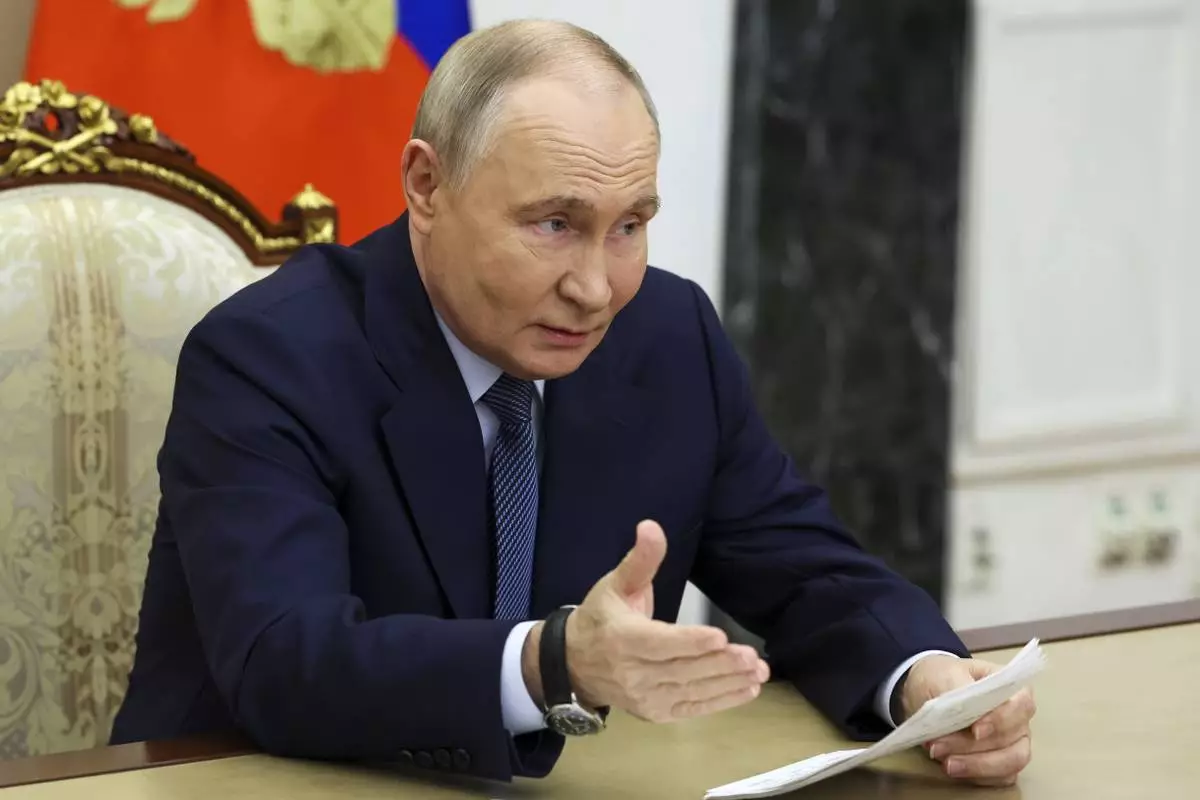
Russian President Vladimir Putin gestures while speaking during a meeting with the leadership of the Russian Ministry of Defense, representatives of the military-industrial complex and developers of missile systems at the Kremlin in Moscow, Russia, Friday, Nov. 22, 2024. (Vyacheslav Prokofyev/Sputnik, Kremlin Pool Photo via AP)
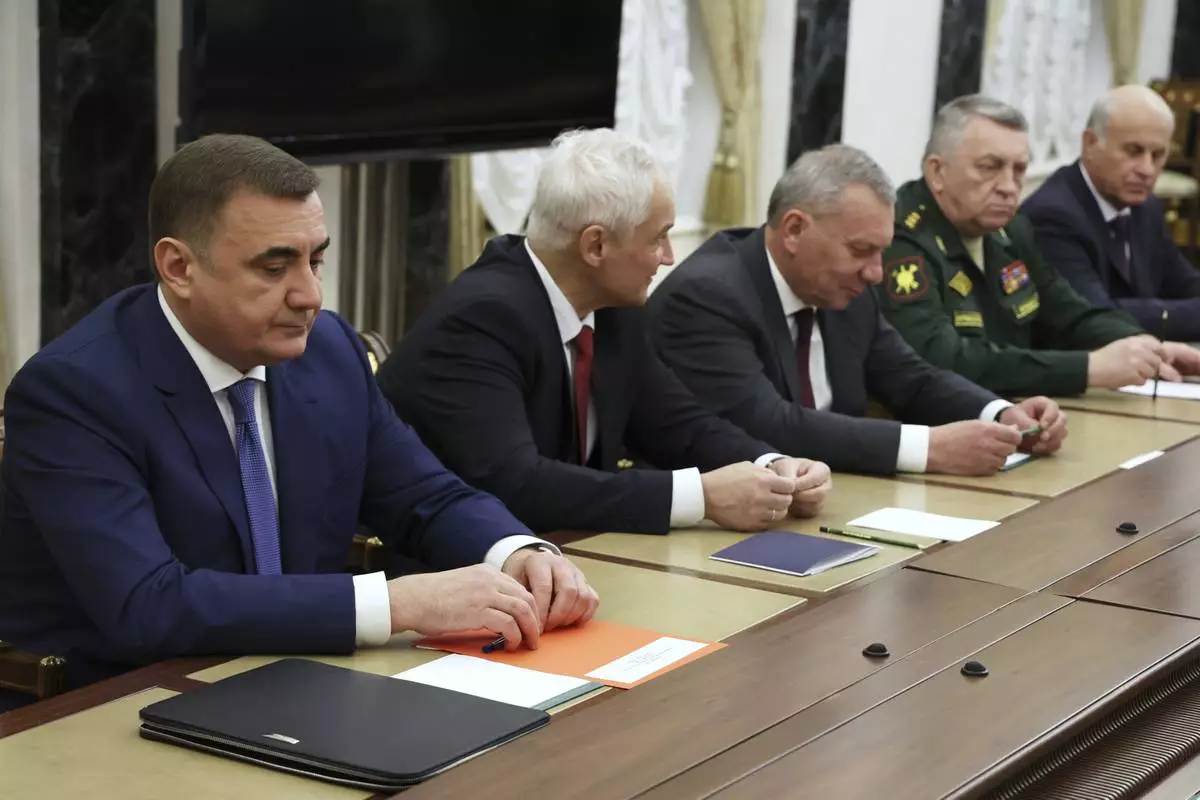
Russian Presidential Aide Aleksei Dyumin, left, Russian Defense Minister Andrei Belousov, second left, the head of Russian state space corporation Roscosmos Yuri Borisov, third right, and other wait for the meeting of Russian President Vladimir Putin and the leadership of the Russian Ministry of Defense, representatives of the military-industrial complex and developers of missile systems at the Kremlin in Moscow, Russia, Friday, Nov. 22, 2024. (Vyacheslav Prokofyev, Sputnik, Kremlin Pool Photo via AP)
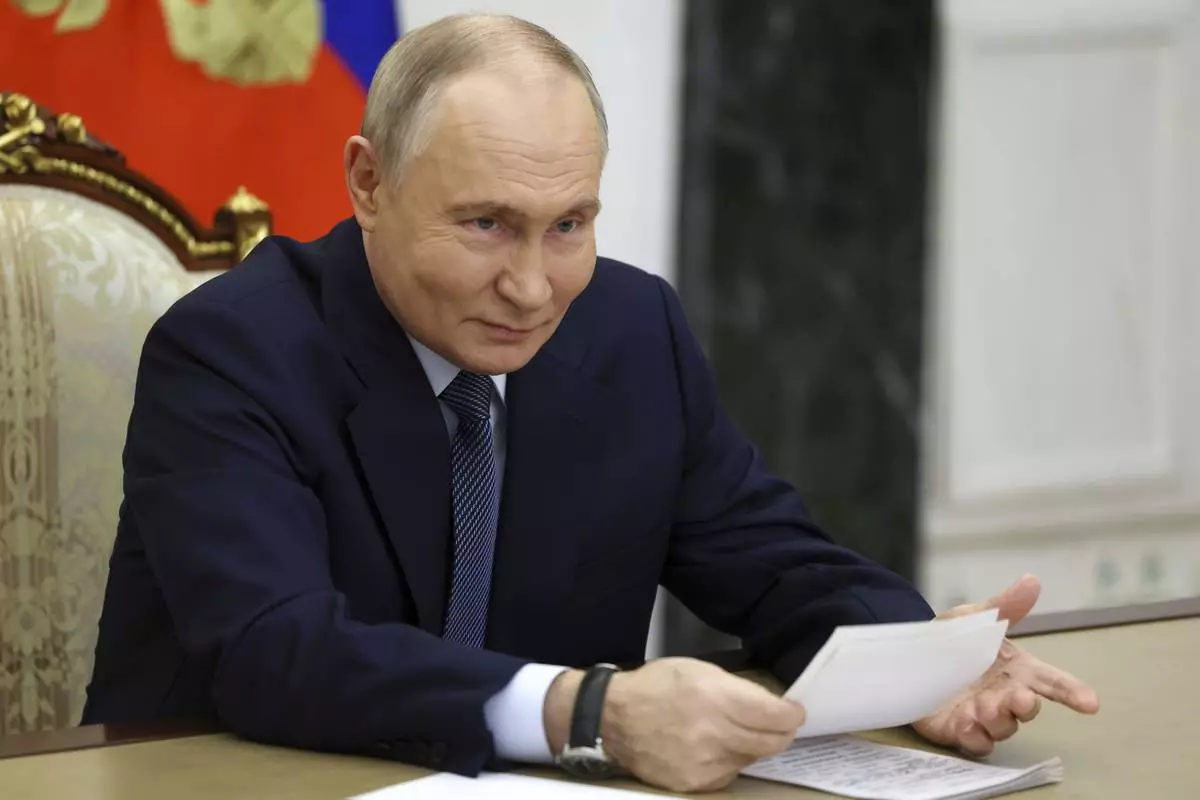
Russian President Vladimir Putin speaks during a meeting with the leadership of the Russian Ministry of Defense, representatives of the military-industrial complex and developers of missile systems at the Kremlin in Moscow, Russia, Friday, Nov. 22, 2024. (Vyacheslav Prokofyev/Sputnik, Kremlin Pool Photo via AP)
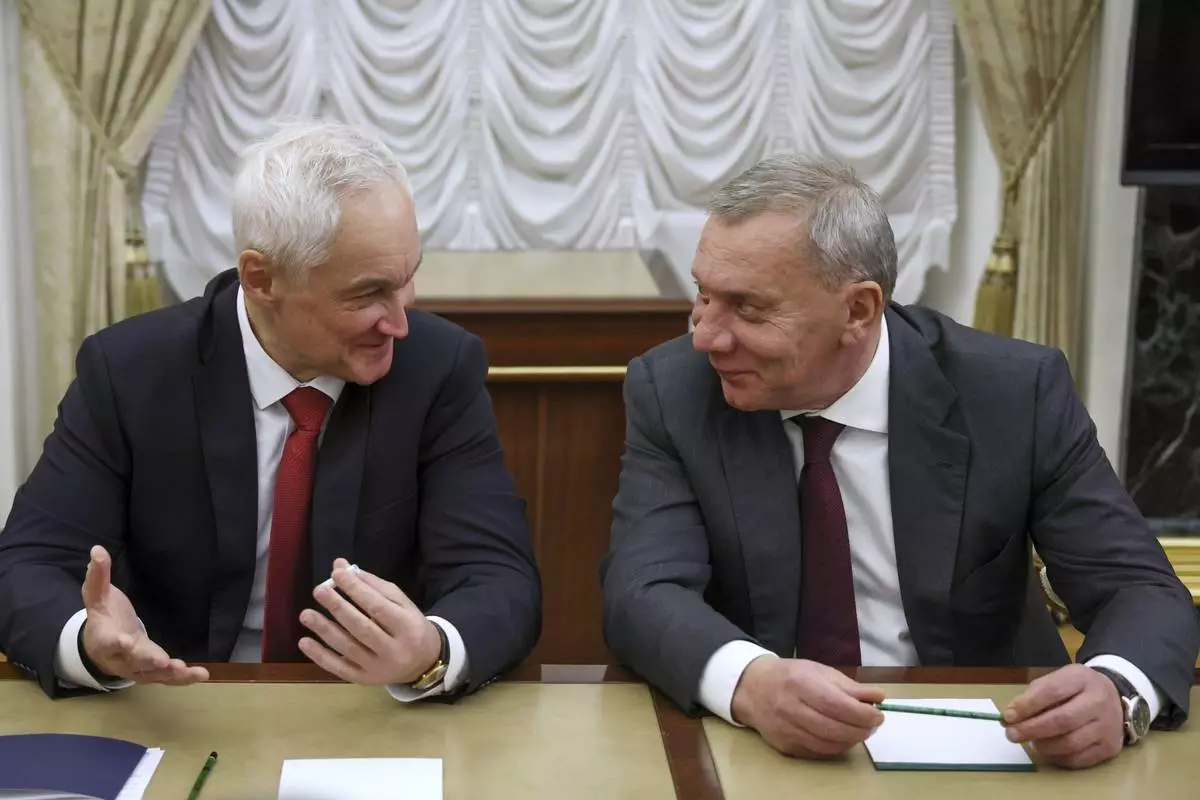
Russian Defense Minister Andrei Belousov, left, and the head of Russian state space corporation Roscosmos Yuri Borisov talk while waiting for the meeting of Russian President Vladimir Putin and the leadership of the Russian Ministry of Defense, representatives of the military-industrial complex and developers of missile systems at the Kremlin in Moscow, Russia, Friday, Nov. 22, 2024. (Vyacheslav Prokofyev, Sputnik, Kremlin Pool Photo via AP)
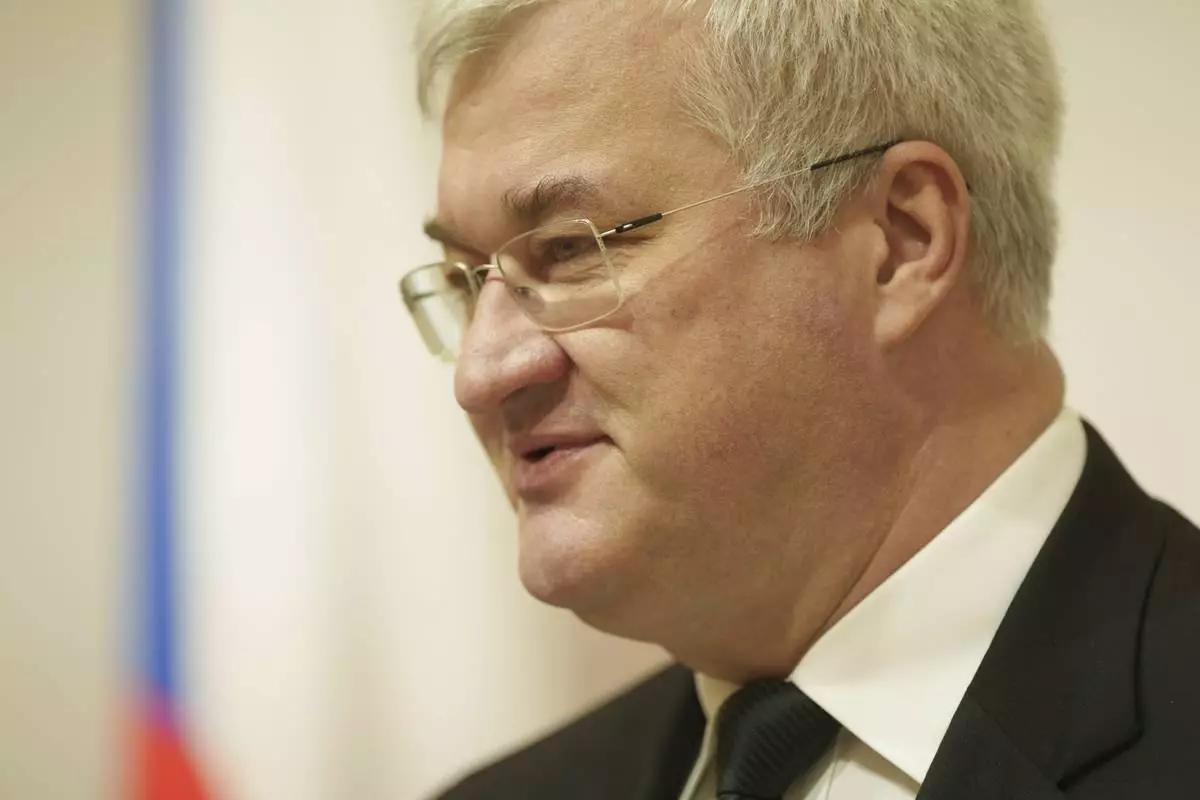
Ukraine's Foreign Minister Andriiy Sybiha speaks to journalists during joint press conference with Czech Republic's Foreign Minister Jan Lipavsky in Kyiv, Ukraine, November 22, 2024. (AP Photo/Evgeniy Maloletka)
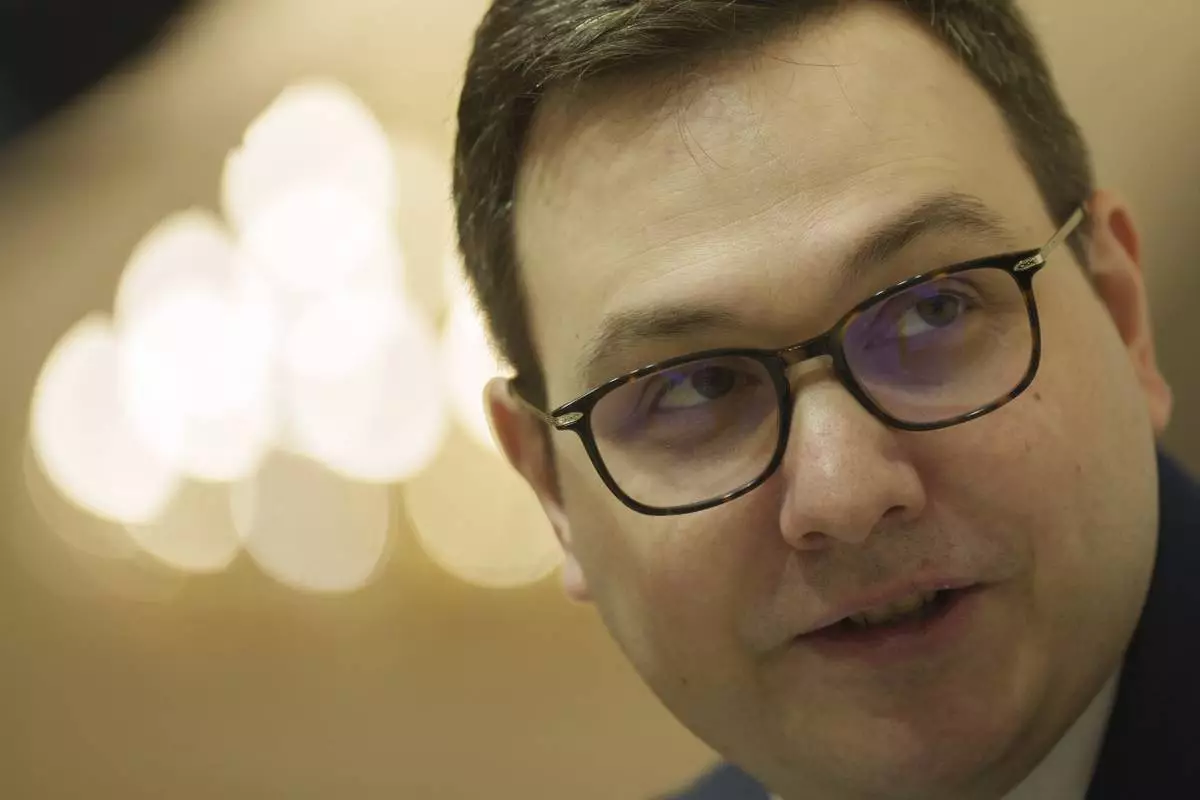
Czech Republic's Foreign Minister Jan Lipavsky speaks to journalists during a joint press conference with Ukraine's Foreign Minister Andriiy Sybiha in Kyiv, Ukraine, Friday, Nov. 22, 2024. (AP Photo/Evgeniy Maloletka)
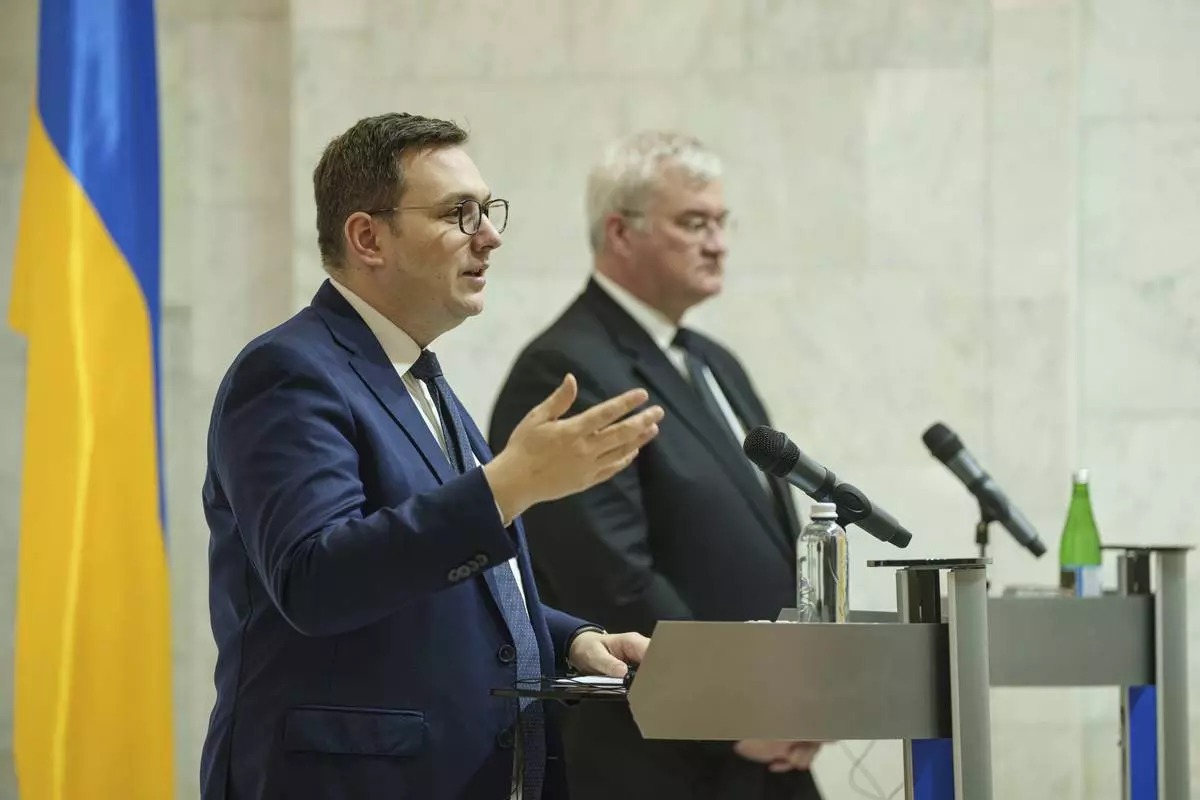
Czech Republic's Foreign Minister Jan Lipavsky speaks to journalists during a joint press conference with Ukraine's Foreign Minister Andriiy Sybiha in Kyiv, Ukraine, Friday, Nov. 22, 2024. (AP Photo/Evgeniy Maloletka)

Czech Republic's Foreign Minister Jan Lipavsky walks after a joint press conference with Ukraine's Foreign Minister Andriiy Sybiha in Kyiv, Ukraine, Friday, Nov. 22, 2024. (AP Photo/Evgeniy Maloletka)
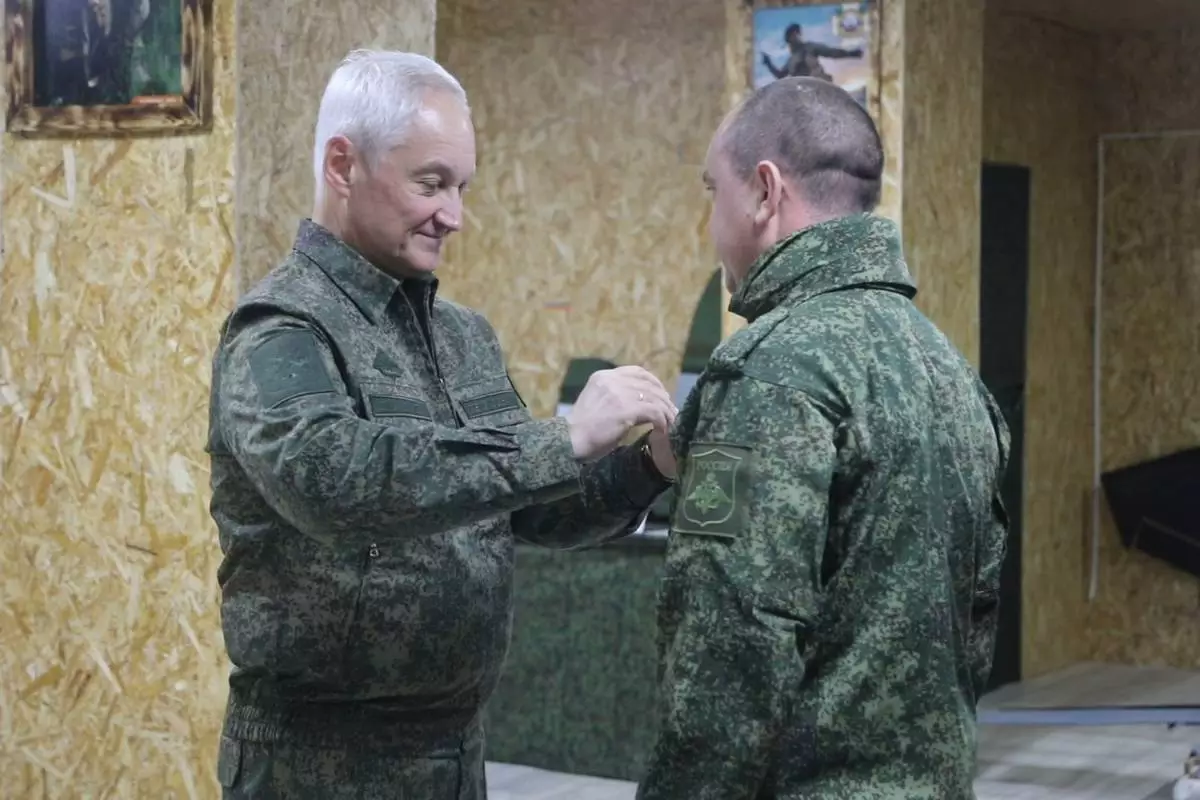
In this photo taken from a video released by Russian Defense Ministry press service on Friday, Nov. 22, 2024, Russian Defense Minister Andrei Belousov, left, gives an award to Russian serviceman of the Battlegroup North in an undisclosed location. (Russian Defense Ministry Press Service via AP)
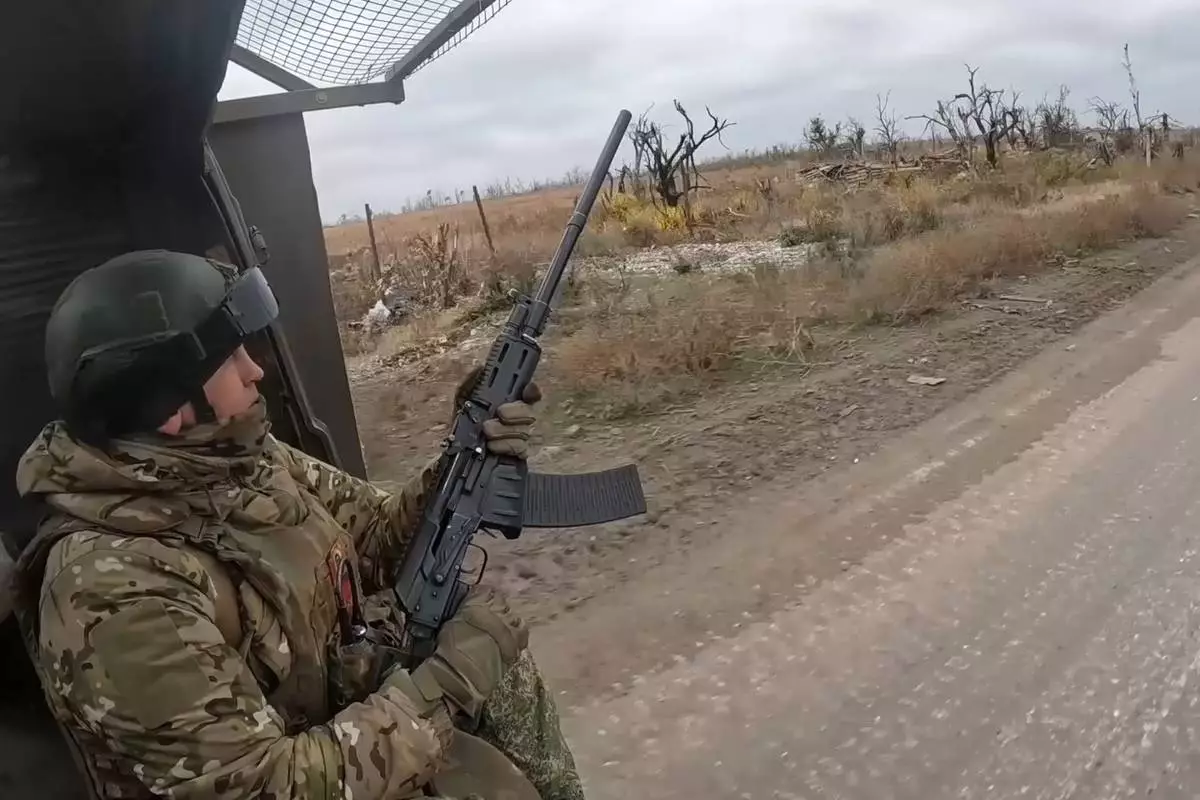
In this photo taken from a video released by Russian Defense Ministry Press Service on Friday, Nov. 22, 2024, a Russian engineer troops serviceman operates at an undisclosed location in Ukraine. (Russian Defense Ministry Press Service via AP)
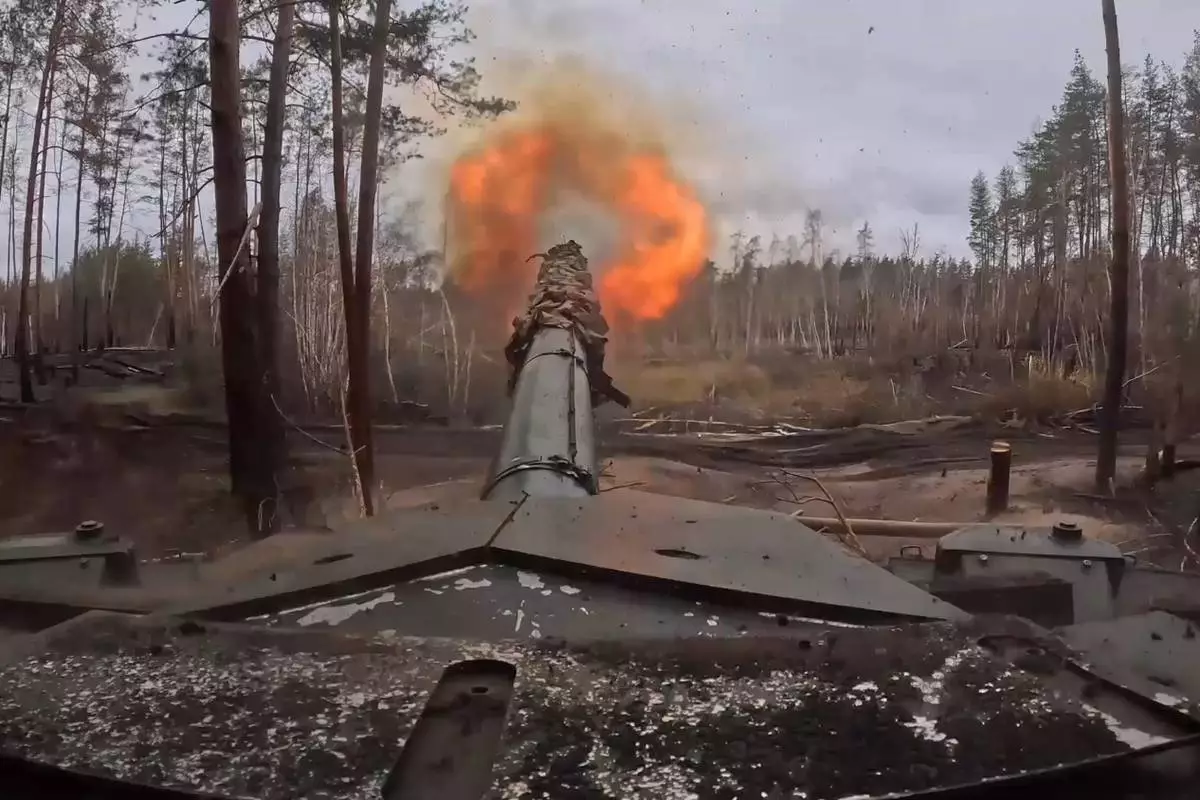
In this photo taken from a video released by Russian Defense Ministry press service no Friday, Nov. 22, 2024, Russian T90M Proryv tank fires towards Ukrainian positions at an undisclosed location in Ukraine. (Russian Defense Ministry Press Service via AP)





















